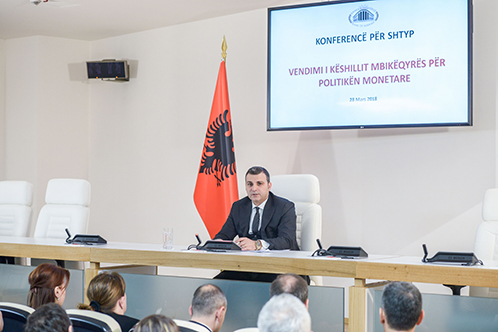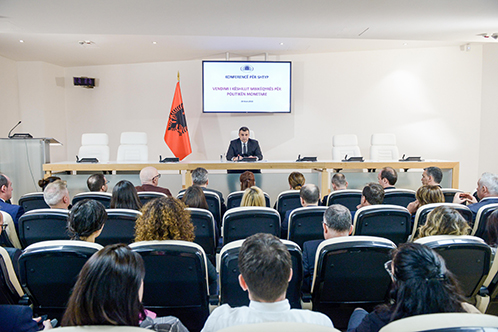BANK OF ALBANIA
Governor Sejko: Statement to the Press Conference on the Monetary Policy Decision of the Supervisory Council of the Bank of Albania
Publication date: 28.03.2018
The new economic and financial information analysed in the intermediate monetary policy report resulted in line with our expectations. The volume of economic activity and inflation continued to trend up in the first quarter of 2018, whereas financial markets were characterised by low interest rates and contained risk premia.
The update of our projections has not changed our outlook for future developments. The Albanian economy is expected to grow further in the medium-term horizon. The improvement of the cyclical position, reflected in an increasingly fuller utilisation of production capacities, is expected to add domestic inflationary pressures and enable the return of inflation to target during 2019.
Judging on this information, the Supervisory Council deemed that the monetary policy stance remains adequate for boosting economic growth and for the sustainable return of inflation to the 3% target.

Let me now explain our assessment in greater detail,
Inflation rose slightly in the first quarter of 2018, standing at 1.7% and 2.1% in January and February, respectively. The rise reflected mainly higher food, water and rent prices.
Yet, inflation remains below the target level. In macroeconomic terms, this performance reflects the combined effect from three factors:
- First, utilisation of production capacities, which remains incomplete, causes the increase in wages and production costs not to be in line with our inflation target.
- Second, foreign pressures on price increase appear weak, driven by the low level of inflation in our trading partner countries and the appreciation of the exchange rate of the Albanian lek.
- Third, economic agents’ inflation expectations remain below our target.
In our judgement, the decelerating effect of these factors will diminish gradually in the medium-term horizon.
The new information suggests that economic growth in the first quarter was underpinned by the expansion of private consumption, and continuation of the upward trend of investments, and the acceleration of the pace of the realisation of budget expenditures. On the other hand, the deficit of trade in goods appeared volatile; it expanded in January and narrowed in February.
The expansion of aggregate demand continues to be accompanied by increase in employment and decrease in unemployment rates, as evidenced by labour market data for the fourth quarter of 2017. Yet, the increase in wages remains sluggish.
The positive performance of the economy was driven by our accommodative monetary policy stance, the improvement of confidence in the economy and the expansion of foreign demand for Albanian goods and services. It was also favoured by the reduction of public borrowing, which has brought risk premia down and has facilitated the monetary policy pass-through to financial markets.

The low interest rates have supported the increase in private consumption and investments, by bolstering lending and reducing the costs of servicing the existing debt. Excluding the exchange rate effect, the portfolio of total credit registered 5.8% average annual growth in January and February. Its growth continued to be supported mostly by the growth of lek credit, whose portfolio recorded 7.2% average annual growth during this period, whereas the portfolio of foreign currency credit recorded 4.7% growth.
In parallel, the accommodative monetary policy has also contributed to the reduction of non-performing loans, by boosting demand and encouraging credit restructuring. This indicator continued to remain at levels similar to the end of 2017.
The Bank of Albania deems that the gradual return of the economy to its potential and the fuller utilisation of production capacities will be accompanied by faster increase in wages and production costs, hence strengthening domestic inflationary pressures. Also, inflation in foreign markets is expected to rise, whereas the appreciation of the exchange rate is expected to diminish, thus enabling a more complete transmission of foreign pressures into domestic markets. Lastly, inflation expectations are expected to trend up, following the factual performance of this indicator.
In line with these assessments, annual inflation is expected to hover around 2.2% for 2018 and converge to our target within 2019.
Based on these judgements, the Supervisory Council decided to keep the policy rate unchaged at 1.25%. The Council decided also to keep the interest rates on overnight deposit and loan facilities unchanged, at 0.25% and 2.25%, respectively.
The Supervisory Council judges that the balance of risks remains on the down side. In particular, the recovery of the European economy remains subject of risks and uncertainties, whereas the supply for bank credit remains tight. Regarding the latter, the Supervisory Council deems that the progressive reduction of the credit risk should be accompanied by more realistic credit policies by the banking sector. This would create premises for fulfilling the needs of the economy for financing, which are expected to be upward in the future.
Reflecting on the available information, and projections from the baseline scenario and risks surrounding them, the Supervisory Council confirms that:
- the intensity of the monetary stimulus will not diminish before the fourth quarter of 2018;
- the monetary policy will remain accommodative throughout the medium-term horizon, to ensure the sustainable return of inflation to target.
Concluding, the Supervisory Council deems that the positive cyclical momentum of the economy should be used for stepping up the implementation of structural reforms, which, in turn, boost the pace of economic growth and increase the resilience to shocks. In particular, these reforms should aim at improving the business climate, enhancing efficiency and competitiveness and expanding the productivity potential in Albania.

 Twitter
Twitter
 Youtube
Youtube
 Facebook
Facebook
 Flickr
Flickr
 RSS
RSS
 Subscribe
Subscribe
 Feedback
Feedback